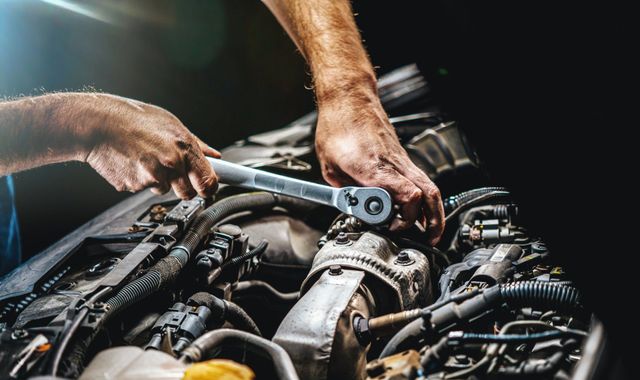All Categories
Featured
The timing belt is an important element of your engine, accountable for integrating the movement of numerous engine parts, such as the crankshaft and camshaft. This guarantees the engine's shutoffs open and close at the appropriate times throughout the burning cycle. While the timing belt might not be something you think about commonly, neglecting its upkeep can bring about substantial engine damage and costly fixings. Here's why timing belt replacement is crucial for your lorry's longevity and efficiency.
What Is a Timing Belt and Exactly How Does It Work? The timing belt is a rubber or composite material belt that attaches the crankshaft to the camshaft in an internal burning engine. The camshaft controls the opening and closing of the engine's consumption and exhaust shutoffs, and it must be timed completely with the movement of the pistons in the engine. The timing belt makes sure that these parts are in sync, allowing the engine to run efficiently.
If the timing belt fails or comes to be broken, the camshaft and crankshaft will no much longer be synchronized, which can create the engine's shutoffs to strike the pistons. This results in catastrophic engine damages and commonly calls for pricey repair services or perhaps an engine replacement.
Why Is Timing Belt Replacement Important? Over time, the timing belt can wear down due to friction, heat, and basic engine wear. While it may seem like a tiny issue, a faulty timing belt can bring about severe engine problems. Here's why prompt replacement is important:
Preventing Engine Damage: As mentioned, a broken or sliding timing belt can cause the engine's valves and pistons to clash. This causes curved shutoffs, damaged pistons, and in severe instances, a complete engine failing. Replacing the timing belt before it damages can prevent this costly damage.
Preserving Engine Efficiency: A worn-out timing belt can interrupt the synchronization of the engine parts, minimizing total engine performance. Replacing the belt assists keep optimum engine feature, making sure smooth procedure, improved gas effectiveness, and far better performance.
Avoiding Unexpected Break down: A busted timing belt can leave you stranded on the side of the roadway, causing a significant aggravation. By replacing the timing belt at the recommended intervals, you can prevent the threat of an unexpected break down, especially in the center of a long journey or when you the very least expect it.
![]()
Conserving Cash over time: While timing belt replacement can appear like an expense you might want to avoid, it's much less costly than the price of repairing or changing a damaged engine. The replacement cost is reasonably budget friendly compared to the considerable fixings needed if the timing belt breaks. Aggressive upkeep can save you thousands of bucks in repair services and preserve your lorry's worth.
When Should You Replace the Timing Belt? The timing belt substitute schedule can differ relying on your automobile's make and design. Generally, most producers advise replacing the timing belt every 60,000 to 100,000 miles. It's always best to consult your owner's handbook or a relied on mechanic for specific recommendations for your lorry.
Indicators that your timing belt might be in requirement of substitute consist of unusual engine noises such as grumbling or ticking, trouble beginning the engine, or a noticeable decrease in engine performance. If you experience any of these signs and symptoms, it is essential to have the timing belt examined right away.
![]()
Conclusion. Changing the timing belt at the suggested intervals is a vital component of keeping your engine's wellness and making certain that your car runs smoothly. A damaged timing belt can lead to costly repair work, engine failing, and unexpected malfunctions, which can be prevented with appropriate maintenance.
What Is a Timing Belt and Exactly How Does It Work? The timing belt is a rubber or composite material belt that attaches the crankshaft to the camshaft in an internal burning engine. The camshaft controls the opening and closing of the engine's consumption and exhaust shutoffs, and it must be timed completely with the movement of the pistons in the engine. The timing belt makes sure that these parts are in sync, allowing the engine to run efficiently.
If the timing belt fails or comes to be broken, the camshaft and crankshaft will no much longer be synchronized, which can create the engine's shutoffs to strike the pistons. This results in catastrophic engine damages and commonly calls for pricey repair services or perhaps an engine replacement.
Why Is Timing Belt Replacement Important? Over time, the timing belt can wear down due to friction, heat, and basic engine wear. While it may seem like a tiny issue, a faulty timing belt can bring about severe engine problems. Here's why prompt replacement is important:
Preventing Engine Damage: As mentioned, a broken or sliding timing belt can cause the engine's valves and pistons to clash. This causes curved shutoffs, damaged pistons, and in severe instances, a complete engine failing. Replacing the timing belt before it damages can prevent this costly damage.
Preserving Engine Efficiency: A worn-out timing belt can interrupt the synchronization of the engine parts, minimizing total engine performance. Replacing the belt assists keep optimum engine feature, making sure smooth procedure, improved gas effectiveness, and far better performance.
Avoiding Unexpected Break down: A busted timing belt can leave you stranded on the side of the roadway, causing a significant aggravation. By replacing the timing belt at the recommended intervals, you can prevent the threat of an unexpected break down, especially in the center of a long journey or when you the very least expect it.

Conserving Cash over time: While timing belt replacement can appear like an expense you might want to avoid, it's much less costly than the price of repairing or changing a damaged engine. The replacement cost is reasonably budget friendly compared to the considerable fixings needed if the timing belt breaks. Aggressive upkeep can save you thousands of bucks in repair services and preserve your lorry's worth.
When Should You Replace the Timing Belt? The timing belt substitute schedule can differ relying on your automobile's make and design. Generally, most producers advise replacing the timing belt every 60,000 to 100,000 miles. It's always best to consult your owner's handbook or a relied on mechanic for specific recommendations for your lorry.
Indicators that your timing belt might be in requirement of substitute consist of unusual engine noises such as grumbling or ticking, trouble beginning the engine, or a noticeable decrease in engine performance. If you experience any of these signs and symptoms, it is essential to have the timing belt examined right away.

Conclusion. Changing the timing belt at the suggested intervals is a vital component of keeping your engine's wellness and making certain that your car runs smoothly. A damaged timing belt can lead to costly repair work, engine failing, and unexpected malfunctions, which can be prevented with appropriate maintenance.
Latest Posts
Boost Your Home with Montana Fence Products
Published Apr 22, 25
1 min read
Unlock Great Deals with Montclare Auto Repair Service Promotions - Available for a Short Time!
Published Apr 22, 25
2 min read
Professional Car Repair Services at Montclare Auto Repair - Don’t Wait, Act Now!
Published Apr 22, 25
2 min read
More
Latest Posts
Boost Your Home with Montana Fence Products
Published Apr 22, 25
1 min read
Unlock Great Deals with Montclare Auto Repair Service Promotions - Available for a Short Time!
Published Apr 22, 25
2 min read
Professional Car Repair Services at Montclare Auto Repair - Don’t Wait, Act Now!
Published Apr 22, 25
2 min read